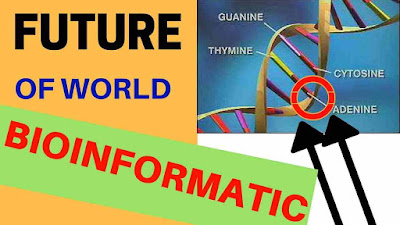EMPLOYMENT OPPORTUNITIES IN
BIOINFORMATICS
Various Application of Bioinformatics
Bioinformatics is the application of "information
technology to the field of molecular biology." It is an interdisciplinary field, developing methods
and software tools for analyzing biological data. The term Bioinformatics was
coined by Pauline Hogeweg and Ben Hesper in 1970 for the study of information
processes in biotic systems.
Bioinformatics is an applied science that specializes in the analysis of the large quantity of biological data, particularly in the area of genomics, proteomics, and molecular biology by employing computational tools.
Bioinformatics is a dynamic and fast-growing interdisciplinary science present in the intersection of biology, mathematics, statics and computer sciences.
Bioinformatics is an applied science that specializes in the analysis of the large quantity of biological data, particularly in the area of genomics, proteomics, and molecular biology by employing computational tools.
Bioinformatics is a dynamic and fast-growing interdisciplinary science present in the intersection of biology, mathematics, statics and computer sciences.
The
field of Bioinformatics is one way to deal with this explosion of data. Bioinformatics is: "a mixture of the
mundane and the sublime."
The mundane includes data integration, data formatting, and conversion (also known as parsing), and automation- "doing a relatively straightforward analysis a million times for few days and then dealing with the volume of results got and turning them into something useful.
It's when the useful parts start to emerge that the sublime aspects surface. Some of the most exciting stuff is working with large bodies of sequence and gene-expression the detects of patterns that come out and how they reproduce biology.
The mundane includes data integration, data formatting, and conversion (also known as parsing), and automation- "doing a relatively straightforward analysis a million times for few days and then dealing with the volume of results got and turning them into something useful.
It's when the useful parts start to emerge that the sublime aspects surface. Some of the most exciting stuff is working with large bodies of sequence and gene-expression the detects of patterns that come out and how they reproduce biology.
Role of Bioinformatics
in the R&D Sector
'Innovations
in Bioinformatics'
generate new Business Insights to employ the Bioinformatics tools to manage
high-throughput data from omics technologies, systems biology modeling and
biomarker discovery.
Knowledge management solutions required are reviewed to identify the latest developments in Bioinformatics, assess the tools and platforms that can improve drug development and benchmark effective implementation of strategies.
Knowledge management solutions required are reviewed to identify the latest developments in Bioinformatics, assess the tools and platforms that can improve drug development and benchmark effective implementation of strategies.
R&D laboratories are coordinating the
analysis of increasing volumes of disparate biological data, largely comprised
of gene and protein sequences. Bioinformatics has enabled data management for
companies to improve their productivity within their R&D programs by
identifying new drug target, diagnostic biomarkers and biomarkers of drug
efficacy and toxicity.
From a systems biology approach, Bioinformatics combines data into interactive models to highlight disease pathways and aid the discovery of on off-target effects of compounds.
Knowledge management solutions are crucial in both instances, enabling project teams to make informed decisions about potential new drugs.
From a systems biology approach, Bioinformatics combines data into interactive models to highlight disease pathways and aid the discovery of on off-target effects of compounds.
Knowledge management solutions are crucial in both instances, enabling project teams to make informed decisions about potential new drugs.
Traditional drug discovery technologies are
reaching the limits of their ability to yield innovative new drugs.
Consequently, pharmaceutical firms and researchers are increasingly turning to
Bioinformatics technologies, which use genetic information for their
functioning.
This study pinpoints opportunities and highlights potential challenges, allowing the companies to develop the most effective business plan.
The Well-established, financially stable firms are seeking technologies to develop or buy Bioinformatics software to speed up the research and development.
This study pinpoints opportunities and highlights potential challenges, allowing the companies to develop the most effective business plan.
The Well-established, financially stable firms are seeking technologies to develop or buy Bioinformatics software to speed up the research and development.











